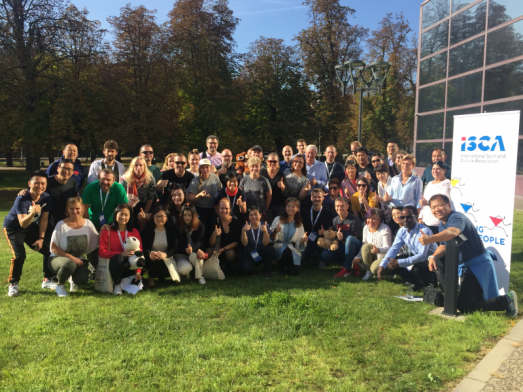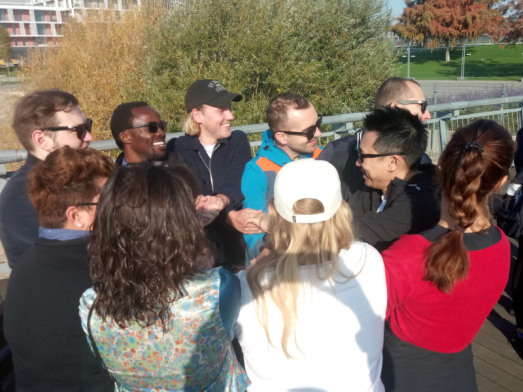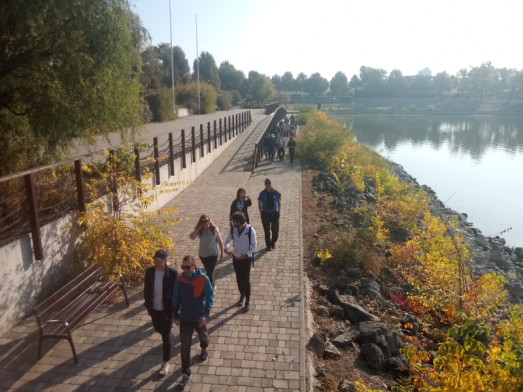How the coronavirus brought our Europe-China exchanges to a halt: And how to take cross-continental challenges in your stride
24/02/2020

Comment by Markus Schwaiger, ISCA.
“To achieve great things, two things are needed; a plan, and not quite enough time,” said the famous composer Leonard Bernstein. With the MOVE Transfer Europe-China project, supported by the EU, ISCA is trying to achieve something outstanding in a two-year framework. As part of my European Voluntary Service at ISCA, I jumped on board at the beginning of this journey and witnessed first-hand the challenges of coordinating 67 partners from two continents in a collaborative project – the most unexpected of which being how to find a Plan B (or C) when an obstacle called the “coronavirus” gets in the way of our cross-continental exchanges.
The aim of the project is to bring leaders from the grassroots sports sector in Europe and Asia together, physically and online, to share their knowledge and best practices. The goal is to enable the participants to work together in future projects by combining the best of two worlds. If we take Bernstein’s quote as a starting point, we did the right thing by creating a plan. What came next unfolded like an adventure:
Step 1 – “A journey of a thousand miles begins with a single step.”
We gather European partners who are willing to share ideas about physical activity and let them shout “Marco!” as loud as possible. We wait for equally motivated colleagues from China, Hong Kong and Macau to complete the name of the well-known explorer by answering “Polo!”
Step 2 – “Teachers open the doors. You enter by yourself.”
As soon as we have found the right number of participants to follow the footsteps of the Venetian traveller, we start to connect “Ōuzhōu” and “Zhōngguó” once again. Our first stop on this expedition is Budapest (the first project meeting, hosted after the MOVE Congress). The capital of Hungary, made of Buda and Pest, which are divided by the Danube, shows in its name how to connect things that seem separated at first glance.
Step 3 – “Fate brings people together from far apart.”
After getting to know each other, and a few drinks with the moon and our shadows later, we become aware of the immanent cultural differences in approaching the challenges of the physical activity field. When people from China, Slovenia, Germany, Spain and other European countries communicate together in a foreign language, English sometimes starts to sound like double Dutch. However, we cannot just leave our cultural differences behind and out of sight; we have to harness them. It is only when we see the differences that they can play their indispensable role in pulling the project towards a prosperous future.

Step 4 – “If you get up one more time than you fall, you will make it through.”
We plan online meetings between Europe and Asia. We look for a properly working digital communication tool. We find a communication tool. It works (more or less). Then we continue looking for a properly working communication tool. We find a communication tool. It works; then it doesn’t. We go back to the search for a working communication tool. Who would have thought that these two regions of the world are even farther apart in the realm of communication tools than they are geographically? This process feels like we are throwing tennis balls high over the Great Wall and our partners have to catch them – it seems hard in the beginning, but we eventually manage to establish a continuous flow of communication.
Step 5 – “A good memory is not as good as a rotten pen.”
Now we write concepts, exchange ideas, present our best practices and hand in our homework, while further improving the outcomes of the online meetings. Things are going well and we can continue our exploration by preparing the next phase of the project – meeting our partners and traveling as a group to China.
Step 5½ – “Be not afraid of growing slowly, be afraid of standing still.”
Suddenly, you realise that you are standing still, the journey has come to a halt. Planning might be everything when it comes to projects, but it fades into insignificance in the face of the unforeseen. In this moment you know what Bernstein meant with “not quite enough time”. The outbreak of COVID-19 not only jeopardises our cross-continental exchange plans (study tours planned for March and May in Asia and Europe) but, at the same time, makes us aware of the serious implications of the current situation. Project-related problems retreat into the background when human lives are at stake. The thoughtful email exchange between participants proves that partnership in this project has already transformed into mutual compassion beyond borders.
Step 6 and beyond – “The past remembered is a good guide for the future.”
At this point, flexibility is more necessary than ever in order to come up with suitable solutions for everyone. Nevertheless, ISCA and the participants are equally keen on carrying the project successfully over the finish line. At a time when political elites on both sides of the globe are in disagreement about so many causes, like the Jets and the Sharks in Bernstein’s West Side Story, it sparks hope when the civil societies of different continents find and share a common love for physical activity.
(Dear reader, have you found some of the references in the text unfamiliar and are curious about what they mean? Use this opportunity to explore a foreign culture and ask a friend or a colleague from the other side of the planet for insightful clarification :)
The MOVE Transfer Europe-China project is supported by EU Preparatory Actions Exchanges and Mobility in Sport

Posted on 24/02/2020 by Markus Schwaiger, ISCA

